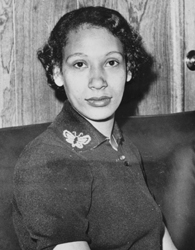Mildred Loving, a black woman married to a white man, missed her home in Virginia. But a state ban against interracial marriage prevented the couple from living there. The Lovings brought their case all the way to the Supreme Court, which led to a historic decision in 1967 that struck down state laws against interracial marriage.
Mildred Loving was born on June 22, 1939 and grew up in Central Point, Virginia, a close-knit community where black and white families lived alongside one another. Mildred a lanky black 11-year-old, nicknamed “Bean,” met Richard, a student at an all-white high school, when he was 17.
In time, they fell in love, and in 1958, Mildred discovered she was pregnant and the couple drove to Washington, D.C., to get married. A few months later, the Lovings were arrested in Virginia, and they pleaded guilty to breaking the state’s Racial Integrity Act.
The Lovings evaded a one-year jail sentence by agreeing not to return to Virginia together for 25 years. But both grew lonely for their home and family, and brought their situation to the attention of the American Civil Liberties Union.
The appeal eventually went before the Supreme Court, which handed down a unanimous ruling that struck down all state laws barring interracial marriage. Chief Justice Earl Warren wrote, “We have consistently denied the constitutionality of measures which restrict the rights of citizens on account of race.”
Sources in this Story
- The Huffington Post: Remembering Mildred Loving
- The New York Times: Mildred Loving, Who Battled Ban on Mixed-Race Marriage, Dies at 68
- NPR: All Things Considered: Loving Decision: 40 Years of Legal Interracial Unions
- Freedom to Marry: Loving for All, By Mildred Loving (PDF)
In 2007, NPR marked the 40th anniversary of the Supreme Court ruling on an episode of “All Things Considered.” ACLU attorney Bernard Cohen described the Lovings as “very simple people, who were not interested in winning any civil rights principle. They just were in love with one another and wanted the right to live together as husband and wife in Virginia, without any interference from officialdom.”
Although the Lovings both stated that they pursued their case for personal, not political, reasons, Mildred Loving later spoke in favor of same-sex marriage. During that 40th anniversary year, a year after an amendment to the Virginia Constitution made it illegal for same-sex couples to marry or enter into a civil union, Loving issued a statement.
“I believe all Americans, no matter their race, no matter their sex, no matter their sexual orientation, should have that same freedom to marry,” she said. “Government has no business imposing some people’s religious beliefs over others. Especially if it denies people’s civil rights.”
Richard Loving was killed by a drunk driver in 1975. Mildred Loving died of pneumonia on May 2, 2008.
The podcast Stuff You Missed in History Class has a two-part episode on the Lovings and their landmark Supreme Court case.











